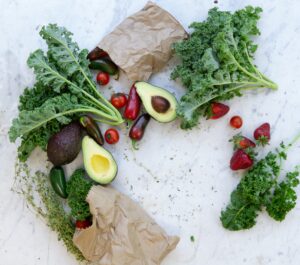How Your Diet Affects Your Skin

Skincare is often associated with topical treatments such as serums, moisturizers, and face masks, but did you know that nutrition also plays a crucial role in maintaining healthy skin? What you eat can affect the appearance, texture, and overall health of your skin. In this blog post, we will discuss the role of nutrition in skincare and provide tips on how to feed your skin from the inside out.
1. The Importance of a Balanced Diet
A balanced diet that is rich in essential nutrients such as vitamins, minerals, and antioxidants is essential for healthy skin. Nutrients like vitamin C, vitamin E, zinc, and omega-3 fatty acids help to protect the skin from damage caused by free radicals, promote collagen production, and improve skin elasticity.
2. Water: The Ultimate Skin Saver
Drinking water is perhaps the easiest and most effective way to keep your skin healthy. Water helps to keep the skin hydrated, plump, and supple, and it also flushes out toxins that can contribute to skin problems like acne and dullness. Aim to drink at least 8-10 glasses of water a day to keep your skin glowing.
3. Foods to Incorporate into Your Diet
In addition to water, there are several foods that you can incorporate into your diet to promote healthy skin. Here are a few:
- Berries: Berries are packed with antioxidants that help to protect the skin from damage caused by free radicals. Blueberries, strawberries, and raspberries are all great options.
- Leafy Greens: Leafy greens like spinach, kale, and Swiss chard are rich in vitamins and minerals that are essential for healthy skin.
- Salmon: Salmon is an excellent source of omega-3 fatty acids, which help to reduce inflammation in the body and promote healthy skin.
- Nuts and Seeds: Nuts and seeds like almonds, walnuts, and flaxseeds are great sources of vitamin E and other essential nutrients that promote healthy skin.
- Avocado: Avocado is a great source of healthy fats that help to keep the skin hydrated and supple.
4. Foods to Avoid
Just as there are foods that can promote healthy skin, there are also foods that can contribute to skin problems. Here are a few:
- Sugar: Consuming too much sugar can lead to inflammation in the body, which can contribute to skin problems like acne and premature aging.
- Processed Foods: Processed foods like chips, cookies, and fast food are often high in sodium and unhealthy fats, which can contribute to skin problems like inflammation and breakouts.
- Dairy: Dairy products like milk and cheese can be problematic for some people, as they can contribute to acne and other skin problems.

5. Supplements for Healthy Skin
In addition to a healthy diet, supplements can also be beneficial for promoting healthy skin. Here are a few to consider:
- Vitamin C: Vitamin C is a powerful antioxidant that helps to protect the skin from damage caused by free radicals. It also promotes collagen production, which can improve skin elasticity and reduce the appearance of fine lines and wrinkles.
- Omega-3 Fatty Acids: Omega-3 fatty acids help to reduce inflammation in the body, which can help to improve skin health.
- Probiotics: Probiotics are beneficial bacteria that help to maintain a healthy gut microbiome. A healthy gut is essential for healthy skin, as the gut and skin are closely connected.
In conclusion, nutrition plays a crucial role in maintaining healthy skin. A balanced diet that is rich in essential nutrients, drinking plenty of water, and avoiding certain foods can all help to promote healthy skin.

